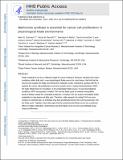| dc.contributor.author | Sullivan, Mark R | |
| dc.contributor.author | Darnell, Alicia M | |
| dc.contributor.author | Reilly, Montana F | |
| dc.contributor.author | Kunchok, Tenzin | |
| dc.contributor.author | Joesch-Cohen, Lena | |
| dc.contributor.author | Rosenberg, Daniel | |
| dc.contributor.author | Ali, Ahmed | |
| dc.contributor.author | Rees, Matthew G | |
| dc.contributor.author | Roth, Jennifer A | |
| dc.contributor.author | Lewis, Caroline A | |
| dc.contributor.author | Vander Heiden, Matthew G | |
| dc.date.accessioned | 2023-01-06T14:46:17Z | |
| dc.date.available | 2023-01-06T14:46:17Z | |
| dc.date.issued | 2021 | |
| dc.identifier.uri | https://hdl.handle.net/1721.1/146998 | |
| dc.description.abstract | Folate metabolism can be an effective target for cancer treatment. However, standard cell culture conditions utilize folic acid, a non-physiological folate source for most tissues. We find that the enzyme that couples folate and methionine metabolic cycles, methionine synthase, is required for cancer cell proliferation and tumour growth when 5-methyl tetrahydrofolate (THF), the major folate found in circulation, is the extracellular folate source. In such physiological conditions, methionine synthase incorporates 5-methyl THF into the folate cycle to maintain intracellular levels of the folates needed for nucleotide production. 5-methyl THF can sustain intracellular folate metabolism in the absence of folic acid. Therefore, cells exposed to 5-methyl THF are more resistant to methotrexate, an antifolate drug that specifically blocks folic acid incorporation into the folate cycle. Together, these data argue that the environmental folate source has a profound effect on folate metabolism, determining how both folate cycle enzymes and antifolate drugs impact proliferation. | en_US |
| dc.language.iso | en | |
| dc.publisher | Springer Science and Business Media LLC | en_US |
| dc.relation.isversionof | 10.1038/S42255-021-00486-5 | en_US |
| dc.rights | Article is made available in accordance with the publisher's policy and may be subject to US copyright law. Please refer to the publisher's site for terms of use. | en_US |
| dc.source | PMC | en_US |
| dc.title | Methionine synthase is essential for cancer cell proliferation in physiological folate environments | en_US |
| dc.type | Article | en_US |
| dc.identifier.citation | Sullivan, Mark R, Darnell, Alicia M, Reilly, Montana F, Kunchok, Tenzin, Joesch-Cohen, Lena et al. 2021. "Methionine synthase is essential for cancer cell proliferation in physiological folate environments." Nature Metabolism, 3 (11). | |
| dc.contributor.department | Massachusetts Institute of Technology. Department of Biology | en_US |
| dc.relation.journal | Nature Metabolism | en_US |
| dc.eprint.version | Author's final manuscript | en_US |
| dc.type.uri | http://purl.org/eprint/type/JournalArticle | en_US |
| eprint.status | http://purl.org/eprint/status/PeerReviewed | en_US |
| dc.date.updated | 2023-01-06T14:36:30Z | |
| dspace.orderedauthors | Sullivan, MR; Darnell, AM; Reilly, MF; Kunchok, T; Joesch-Cohen, L; Rosenberg, D; Ali, A; Rees, MG; Roth, JA; Lewis, CA; Vander Heiden, MG | en_US |
| dspace.date.submission | 2023-01-06T14:36:33Z | |
| mit.journal.volume | 3 | en_US |
| mit.journal.issue | 11 | en_US |
| mit.license | PUBLISHER_POLICY | |
| mit.metadata.status | Authority Work and Publication Information Needed | en_US |
